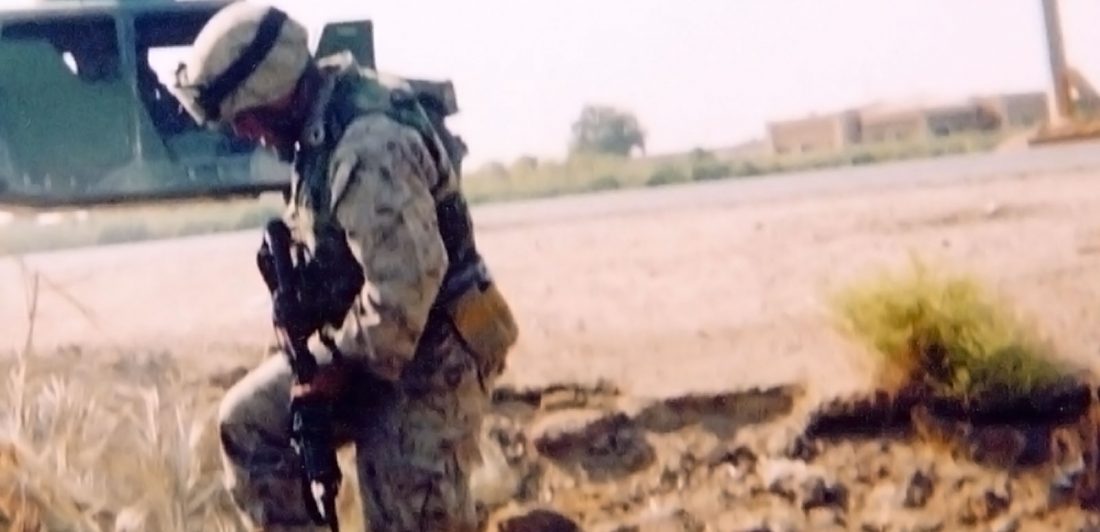An EFP is different from a traditional bomb. Instead of scattering fragments outward, it’s designed to punch straight through armor. The weapon uses a concave metal plate, set in front of an explosive charge. When detonated, the plate reshapes into a slug or rod that travels at extreme speed, tearing through even heavily armored vehicles. What makes an EFP so dangerous comes down to a few key features:
- The metal liner, usually copper or tantalum, reshapes into a solid projectile.
- The slug remains coherent and can travel long distances without losing force.
- The impact can penetrate reinforced steel and armor designed to withstand standard explosives.
- Even tanks, Humvees, and MRAPs have proven vulnerable to EFP strikes.
Other Weapons That Caused Lasting Harm
EFPs weren’t the only threat. Veterans and contractors also faced other advanced weapons that carried devastating consequences, including:
- Improvised Explosive Devices (IEDs): the most common roadside bombs, often hidden in debris or buried underground
- Vehicle-Borne IEDs (VBIEDs): explosives hidden in cars or trucks, sometimes packed with additional shrapnel for maximum destruction
- Shaped Charges: devices that focus an explosive jet capable of cutting through armor
- Rocket-Propelled Grenades (RPGs): portable launchers used to strike convoys and bases
- Mortars and indirect fire weapons: responsible for countless injuries at bases and forward operating posts
These weapons caused catastrophic injuries, left families grieving, and changed the lives of countless Americans who served overseas.
Terrorism Lawsuits and Accountability for State-Sponsored Attacks
Explosively formed penetrators weren’t the only threat U.S. service members and contractors faced overseas. Backed by Iran and other state sponsors of terrorism who manufactured, supplied and trained and armed these deadly groups with weapons. For many Americans injured or killed, the responsibility doesn’t stop with the militant who pulled the trigger or detonated the device; it reaches all the way back to the governments that funded, trained, and armed them.
The Anti-Terrorism Act
Soldiers, families of soldiers, and civilians killed or injured by Iranian-backed violence may file claims under the Anti-Terrorism Act.. These cases aim to hold nations like Iran accountable for their direct role in supporting groups such as Hezbollah and the Islamic Revolutionary Guard Corps (IRGC). The IRGC and Hezbollah provided the training, weapons, and explosives—including EFPs—that were used to target Americans during the Iraq and Afghanistan conflicts.
These lawsuits aren’t abstract legal fights. They’re about real people. The Veterans who live every day with the physical and emotional scars of an EFP blast. The contractors whose lives were permanently altered by roadside bombs. And the families who made the ultimate sacrifice and lost someone they loved to an attack traced back to Iranian-backed forces.
Our Commitment to Veterans and Contractors
We’ve represented service members and contractors in these cases, helping them fight back in court after everything they endured abroad. These lawsuits are complex, but at their heart, they’re about people. They’re about honoring the sacrifices of men and women who answered the call and giving their families the chance to rebuild.
For many veterans, the battle didn’t end when they came home. Injuries from an EFP or IED last a lifetime, and the fight for justice can feel overwhelming. That’s why The Carlson Law Firm continues this work: because no one should carry that burden alone. We believe in compassion, accountability, and standing up for those who have already given so much.
Helping Veterans and Families Move Forward
We are a veteran-owned and operated law firm headquartered at Fort Hood, Texas. Further, we have been fighting for the rights of active duty service members, veterans and civilians across the nation for more than 40 years.
Explosively formed penetrators may be remembered as one of the most lethal threats faced in the Iraq and Afghanistan wars, but the story doesn’t stop with the weapon itself. It continues with the people left behind—the veterans adapting to new realities, the families grieving their loved ones, and the contractors who found themselves in harm’s way. Our firm remains committed to them all, with one clear message: you are not forgotten, and your fight for justice matters.
The Carlson Law Firm has stood alongside service members, contractors, and families in these terrorism lawsuits. We’ve helped servicemembers and their families recover billions of dollars for their injuries at the hands of state-sponsored terrorism. Our work has focused on exposing the chain of responsibility that stretches beyond the battlefield and into the halls of governments that sponsored this violence. By pursuing accountability under U.S. law, we help ensure that those who carried out or supported these attacks cannot escape responsibility for the devastation they caused.
Contact The Carlson Law Firm to discuss your case with a qualified EFP Lawyer.




